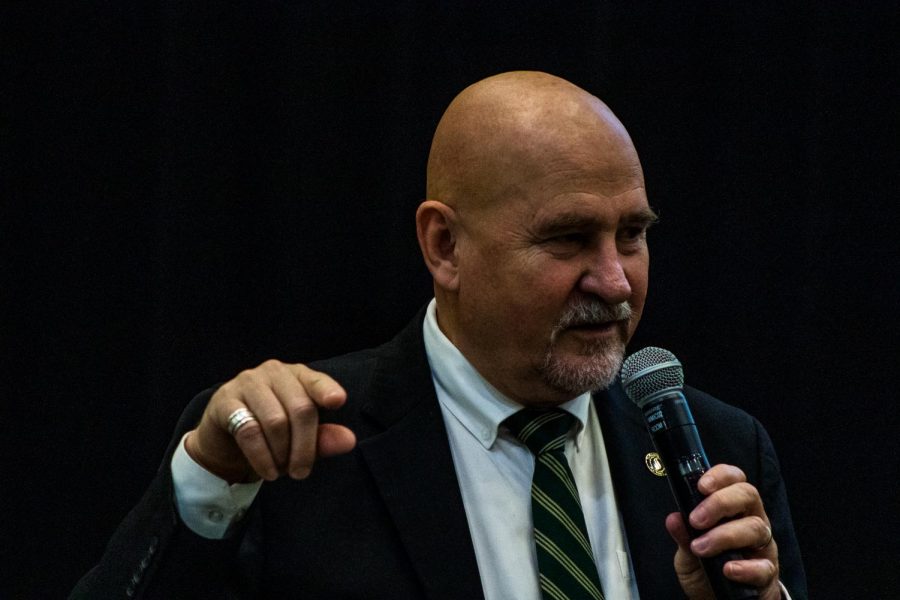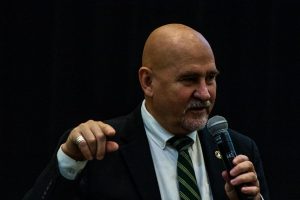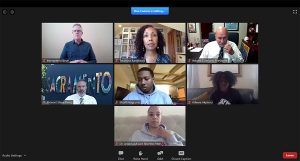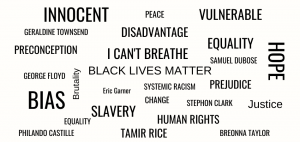President Nelsen talks Sac State anti-racism plan, budget cuts at virtual fall address
Nelsen supports ethnic studies graduation requirement
Sac State President Robert S. Nelsen addresses the audience on the efforts on the university’s behalf on handling COVID-19 at the University Union on Wednesday, March 4. On Thursday, Sept. 3, 2020, Nelsen gave a livestreamed fall address where he spoke about an anti-racism plan for campus and budget concerns.
September 3, 2020
Sacramento State President Robert Nelsen spoke about how COVID-19 and the Black Lives Matter movement has affected Sac State’s mission on Thursday at his livestreamed fall address.
Nelsen welcomed the 31,735 students he said enrolled at Sac State this fall and shared Sac State’s achievements and plans for the school year.
The State Hornet has compiled key takeaways from the address and important information that informs what the fall semester will look like.
Anti-Racism
Nelsen denounced the killing of George Floyd and shooting of Jacob Blake.
“We cannot be blind to the racism that we see in our country, in Sacramento and yes, here on our campus,” Nelsen said.
Near the end of the spring 2020 semester, an economics professor was seen in a viral video where his wife used a racial slur, causing students to circulate a petition for the professor’s removal.
On May 30, Nelsen sent a SacSend email as a response to the events in Minneapolis and protests in Sacramento that promised an anti-racism and inclusive campus plan.
On Thursday, Nelsen recalled the email and the nine actions that were presented for Sac State to become an anti racist campus.
Sac State human resources is vetting an advocate who will work in the Division of Inclusive Excellence and will serve people experiencing racism and bias on campus, Nelsen said.
The Center for Teaching and Learning and the Division for Inclusive Excellence were in charge of explicitly addressing anti-racist curriculums and anti-bias pedagogy in the recent summer camp for professors, Teach-On!.
In spring 2019 Sac State students participated in a climate survey designed by the National Association of Collegiate Campus Climates. As a result of the survey, the president’s cabinet created seven committees to set goals and strategies in specific focuses:
- Mattering and affirmation
- Racial and inclusive engagement
- Anti-racist learning and literacy
- Anti-racist curriculum pedagogy and assessment
- Encounters with racial stress and bias
- Institutional commitment
- Impact off and on the Sacramento region
On Sept. 29, Sac State will host a virtual convocation with speakers Ibram X. Kendi, professor and director of Boston University Center for Antiracist Research and Shaun Harper, professor and executive director of the USC Race and Equity Center. Nelsen said the event will not only advance Sac State’s commitment to anti-racism, but will help in learning how to be anti-racist.
RELATED: FAQ: What you need to know about the ethnic studies bill, AB 1460
Nelsen approved of bill AB 1460 signed into law by Gov. Gavin Newsom which mandates that California State University students take an ethnic studies course to graduate.
“The implementation of AB 1460, the bill that will require all 23 CSU campuses to have mandatory ethnic studies in general education, will be a historic step into deepening our curriculum and will truly transform our students,” Nelsen said.
Story continues below screenshot.
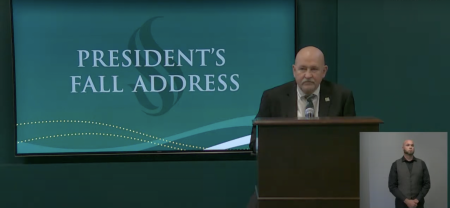
Budget
Newsom revised California’s 2020-21 budget due to COVID-19, cutting $18 million from Sac State’s budget, Nelsen said.
Nelsen said he does not expect funding at Sac State to be restored this year or next year. He added that there was no momentum towards lifting the current hiring freeze and travel and conference bans.
Nelsen said Sac State will not resolve the budget cuts by encouraging retirement or cutting one-time funds. He said the school is “quickly” spending reserves to cover COVID-19 expenses and add class sections.
“These cuts will require us to resize the university,” Nelsen said. “We must learn to do less with less.”
Philanthropy and Scholarships
Nelsen highlighted philanthropy and how Sac State donors have donated over $50 million this year.
Approximately $26 million of the donations came from the donation of land for the Placer Ranch center.
RELATED: CSU Board of Trustees approves Sac State Placer Center
Approximately $40,000 is for housing for homeless students, $100,000 is for emergencies students are experiencing and $20,000 is for the student food pantry.
Sac State has awarded students an additional $147,000 in scholarships from the year before resulting in a total of $1,925,885 in scholarships for this year, Nelsen said.
Nelsen presented the George Floyd emergency grant, which will provide financial support for students who have experienced trauma.
Nelsen said that philanthropy is only a lifeboat for students.
Graduation Rates
Sac State had a record-setting 9,500 students eligible to graduate last spring.
The four-year graduation rates have been increasing for students of color, Nelsen said. The four-year graduation rate is 14.6% for Black students, 21.9% for Latinx students and 17.6% for Asian and Pacific Islander students, he said.
The overall two-year graduation rate this year is 47.5%, Nelsen said. The rate is 40.1% for Black transfer students, 48.1% for Latinx transfer students and 39.4% for Asian and Pacific Islander transfer students.
Sac State ranked 13th in graduation rates out of the 23 CSU campuses in 2019, up from 22nd in 2016.
Explaining the graduation rates, Nelsen said a full load of 15 units can be too much for some students and that students may reconsider their majors.
“They may very well want to explore other majors,” Nelsen said. “Not everyone needs to or even should graduate in four years.”
This semester Sac State began early advising and pre-enrolled some freshmen into 15 units. 91% of freshmen enrolled in at least 14 credits this semester and approximately 252 freshmen chose to have undeclared majors, Nelsen said.
Second-year students are taking an average of 14 units, and third-year students are taking an average of over 13 units. Both are a record for Sac State, Nelsen said.






























































































































